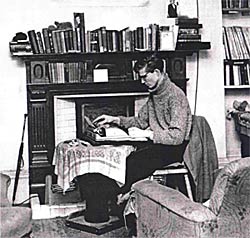
Ken MacLeod's obit, reminds us of the start of Wilson's fame:
... The Outsider [1956] ticks all the boxes for a successful cult book: readable style, significant subject-matter, and reckless assertion. The effect was exhilarating.
It was also, unfortunately, often misleading. Wilson had read all the books he cited and given them much thought, but the thought was slapdash, and Wilson took care to be off down the street, whistling, cash in hand, before the cement crumbled. Here he is, for instance, on Roquentin, the narrator of Sartre’s novel La Nausée (1938):
Roquentin feels insignificant before things. Without the meaning his Will would normally impose on it, his existence is absurd. Causality — Hume’s bugbear — has collapsed; consequently there are no adventures.
The aside — ‘Hume’s bugbear’ — is pure sleight of hand. (David Hume, after all, was convinced he’d solved the problem of causality: it was no bugbear to him.) Likewise the capitalisation of ‘Will’, a crafty reminder that this is not just any will, but the metaphysical Will of Arthur Schopenhauer’s The World as Will and Idea (1818), to whose ‘formidable dialectical apparatus’ Wilson had tipped his hat a few pages earlier. Nevertheless, there’s no denying Wilson’s knack of engaging the reader, or his capacity to make an account of any piece of philosophy or literature race like an action sequence.
....
We skip over the fact Hume did not actually think he had "solved the problem of causality," and quote another obit (from The Telegraph) which sets the context of Wilson's first book:
Wilson became a celebrity almost overnight and the book went on to be translated into 12 languages. It added to the excitement that he had written The Outsider in the Reading Room at the British Museum, while spending his nights in a sleeping bag on Hampstead Heath. On finding himself lionised, however, Wilson spent lavishly on wine, whisky and long-playing records; meanwhile, his frankly expressed opinion that he was “a genius” soon earned him the enmity of Fleet Street.
Colin Wilson wrote a number of biographies in his career, including one about Maslow,
New Pathways in Psychology: Maslow and the Post-Freudian Revolution. (2004). There are several cat references in this book, quotes Wilson rounded up, and they are of interest:
Wilson quotes Yeats, saying he wrote poetry the way a sick cat eats Valerian; and Margaret Lane [a novelist] listing her emotional response to a cat with a hurt paw as excessive.
It was not hard to find feline references in Wilson's many books, but look again at that picture of the young intellectual. My research indicates there is not a cat on the shabby armchair. As smart as Wilson was, a cat, might have been a bit of ballast for this writer.
No comments:
Post a Comment